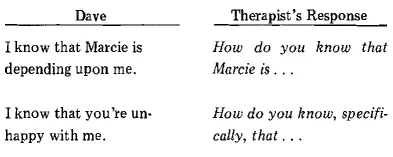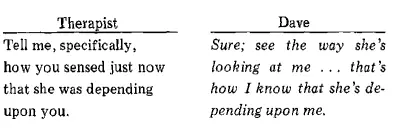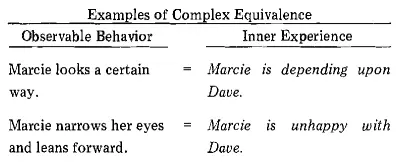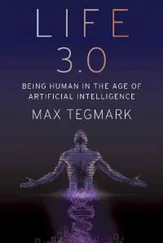If you loved me, you would know without my telling you.
Extracting from the transcript, we have:

In these two exchanges, we can identify both the Mind-Reading pattern and one of the ways in which the therapist can usefully challenge this process by specifically asking for a detailed description of the process by which the person (Dave, in this case) obtained the information he claims to have. This process (Mind Reading) is one of the most tragic ways by which well-intentioned people in a family can distort their communication and cause pain. We realize that it is possible to understand a great deal about the inner experience of another person without his having to describe it in detail in words. One of the skills which we continue to sharpen in our work as therapists is the ability to identify and understand another person's experience through the analogue (nonverbal) messages which they present to us. The tone of voice, the posture, movements of the hands and feet, the tempo of speech — are all important messages which we each utilize in our work. We accept for ourselves the rule of explicitly checking our comprehension of non-verbal messages rather than basing further communication upon our assumed understanding of those messages. What we have noticed time and again is that, under stress, people tend to hallucinate the inner experience of others and to act upon those hallucinations without checking first to find out if they match the actual experience of the other person. Once this process of Mind Reading without checking begins, clear communication becomes difficult and finally collapses, and we see a family in pain. In our experience, the therapist's ability to identify and effectively challenge the Mind-Reading pattern is one of the most important interventions in assisting a family to move from a rigid, closed system to one which allows freedom to grow and change.
Closely associated with the general pattern of Mind Reading is another important pattern, that of Complex Equivalence [11] Complex Equivalence is the relationship between a word or set of words and some experience which those words name. For example, for some people the word caring means always responding when help is requested; for others, it means knowing what the other person requires and supplying it without any need for the other to ask; for still others, it means touching gently; looking happy when the other person approaches, etc. Thus, the pattern of Complex Equivalence is roughly the same as the idea of the definition of the word(s) involved; however, Complex Equivalence is not of the standard dictionary definition, but must be relativized to the particular person's model of the world. See The Structure of Magic, Volume I, pages 88-90; Patterns of the Hypnotic Techniques of Milton H. Erickson, M.D., Volume II.
— the names which people attach to their experience.


Dave is presenting us with an excellent illustration of the way in which people calibrate their experience. Dave has decided that, whenever he sees Marcie looking at him in a certain way (not specified), she is depending upon him; she is experiencing an inner state which he labels "dependency." In the second example, Dave has decided that, whenever Marcie narrows her eyes and leans forward, she is unhappy with him. What is common to both instances is that Dave has equated a piece of Marcie's observable behavior with her total communication and then has labeled it an inner experience.

What we are illustrating here is that people cause themselves pain and difficulty by attaching a word (label) to some part of their experience and mistaking the label for the experience. One powerful phenomenon we have seen in our work is the fact that people pay particular attention to different portions of their experience and, subsequently, may come to attach the same label to a very different experience. For example, for people who use their visual skills most extensively, the word respect will, typically, have something to do with eye contact, while people who emphasize body sensations (kinesthetic representational system) will pay more attention to the way others touch them. By this process, people may use the same word to describe very different experiences. We call this process Complex Equivalence (the experiences which the words represent) and, typically, it may be quite diverse for different people. In other words, instead of using feedback (for example, asking Marcie what was going on), Dave has calibrated his experience so that, whenever he detects certain movements by Marcie, he "knows" what she is experiencing. Notice that the therapist makes two different types of responses to Dave's Mind-Reading— Complex-Equivalence statements. First, the therapist re-states the claim that Dave has made about Mind Reading and the specific Complex Equivalence which he uses. This serves two purposes: The therapist checks to make sure that he understands the Mind-Reading process which Dave is presenting; at the same time, the therapist's re-statement allows Dave to hear a complete description of the process. In fact, those with whom we work frequently will laugh out loud when the contention which they have just made is repeated to them, recognizing that the connection claimed is spurious. For others, the therapist's re-statement allows them to fully understand the process for the first time. Dave's response is a good example of this:
I never have been able to get a handle on it; you know, altogether, like I felt when you just said it now . . .
The second response which the therapist makes is to challenge the Mind-Reading—Complex-Equivalence pattern in the family by turning to the other family member involved — in this case, Marcie — and asking her to state whether or not Dave's Mind Reading—Complex Equivalence was accurate. As the transcript shows, Dave was hallucinating. (We use this word [hallucinate] when we are referring to ideas which are "made up" when factual data are not available. Our brain must make something from everything. We do not consider it pathological in this context, only descriptive.) Marcie was not, in fact, unhappy with him at that point in time. In our experience in therapy, so much of the pain experienced by members of a family is connected with calibrated communication, communication based upon Mind Reading and Complex Equivalence. This makes the therapist's ability to detect and effectively challenge these patterns extremely important.
Marcie: No, I'm trying to understand what's going on here, and,. . .
Therapist: Thank you, Marcie. (turning back to Dave) Dave, I want you to try something new for yourself and Marcie. Are you willing to try something new, Dave?
Dave: Well, yeah, OK . . . I'll try. What is it?
Therapist: Dave, I want you to look directly at Marcie and tell her how you're feeling right now, and as
you do . . .
Dave: (interrupting) Oh, no; I'd really like to, but I just can't.
Therapist: You can't, Dave? What stops you?
Dave: Huh? What stops me?
Therapist: Yes, Dave, what stops you from looking directly at Marcie while you tell her what you are feeling?
Читать дальше















